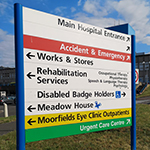Urgent action required to prevent avoidable harm and deaths amongst non COVID-19 patients
By Peter Walsh
Chief Executive, Action against Medical Accidents
June 2020
- Government must urgently open up services for non-COVID patients or risk avoidable harm to thousands
- Many NHS hospitals running at 60% of capacity or less, with Nightingale hospitals standing empty and private sector capacity unused
- COVID risk should be balanced against risk posed by delayed diagnosis and treatment of other conditions
 Whilst the drastic action taken at the start of the current pandemic to protect patients, staff and the NHS by closing down many NHS services other than those treating COVID-19 patients was understandable, AvMA is increasingly concerned about the consequences for patients with other conditions which need urgent treatment or diagnostic procedures.
Whilst the drastic action taken at the start of the current pandemic to protect patients, staff and the NHS by closing down many NHS services other than those treating COVID-19 patients was understandable, AvMA is increasingly concerned about the consequences for patients with other conditions which need urgent treatment or diagnostic procedures.
We have already been receiving enquiries from patients or their families where the unavailability of such services appears to have resulted in avoidable harm or even death. Solicitors around the country tell us that they have also.
Thanks to the measures put in place and especially the heroic efforts of NHS staff, the NHS has coped with the worst of the pandemic. But now many NHS hospitals are running at about 60% capacity, Nightingale hospitals stand empty, and little use is being made of the capacity in the private sector which the Government commissioned (at huge cost) to help cope with the pandemic.
It is now imperative that the Government massively accelerates the opening up of services for patients with potentially life-threatening conditions and for vulnerable people, and makes maximum use of all available facilities. Not to do so is running the risk of a catastrophe which could affect thousands more patients who do not have COVID-19.
Whilst the intention to protect would-be patients from the risk of contracting COVID-19 is laudable, this has to be balanced with the risk of not getting diagnosed or treated for conditions which are probably more likely to harm or kill them. One thing that has been missing in all of this is giving patients themselves any say in what is most important to them.
I am not aware that there was any consultation with patients’ groups at a national policy level about this, let alone with individual patients who have to pay the consequences. This seems at odds with the principles of informed consent, re-enforced by Montgomery.
There are some parts of the NHS that have shown that urgent services can be kept available safely, even in the face of the pandemic. But this is nowhere near enough.
There is a growing back-log of patients requiring diagnostic services or urgent treatment which will take a long time to catch up on. That is why we need a clear strategy from the Government (or governments across the UK) and priority given to this.
The problem is probably most acute in cancer treatment and diagnosis, but there are also huge problems with access to neurological and cardiology services.
As usual, it is the vulnerable who suffer most. The CQC recently reported a disturbing increase in unexplained deaths amongst people with learning disabilities during the pandemic.
By following the example of parts of the country where urgent services have been maintained and with good planning, sufficient protective equipment and other safeguards for staff and patients, this can be done safely (or at least with the minimum risk).
AvMA is working with clinicians, other patients’ charities, solicitors and barristers to raise awareness of these issues and to urge the Government(s) to act urgently. Expect to see more media coverage in the next days and weeks.
You can help by tweeting or writing about this. We have created a petition on the UK Government website about this which will be live very shortly – if you email us we will let you know when it is. Please sign it and encourage all your friends, family and colleagues to do so.
